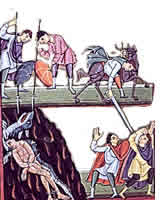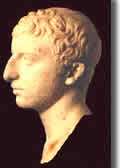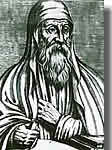| |||||||||||||||||||||||||||||||||
| Getting Started | Facts > Triumph > Jesus Scholarship |
| Hellenism | Syncretic Judaism | Jesus legend | Jesus Scholarship | |
|
|
Apostolic Legend | Apostolic Scholarship | Over Paganism | Over other Christianities |
|
No one alive when Jesus lived ever
mentioned Him |
Here's a factoid you maybe didn't pick up in Sunday school: |
Non-Christian No non-Christian alive when Jesus lived ever mentions Him at all. Not once. |
||||||||||
Christian
There is no contemporary record that Jesus existed. None. That's not a guess, that's a fact. Hey, wait a minute—the uniqueness of Christ is a point the canonical writings hit pretty hard. After Jesus or not, don't the early Christian writings prove Christianity is unique? |
||||||||||
You've seen here—directly from the pens of the first Christians themselves—that in the second century, at the foundation of the faith, even before the Gospels were available, Christians worried about the similarities between Jesus and the Pagan Gods, worried about the fact the Pagan Gods came first, and explained the similarity as "demonic imitation"—copying by the Pagans backwards in time! Silly? Yeah. They were in a bind, they had to come up with something. You got anything better, we'd all like to hear it. What the New Testament and other early Christian writings prove is that after Jesus died, Christians eventually came to believe He was the uniquely true God. The gospel describes John the Baptist baptizing people. The gospel doesn't describe where John got the idea of baptism. The gospels describe Jesus' miracles; they don't describe where the idea of miracles came from. |
||||||||||
|
The next time you're in Church When they get to the part about the uniqueness of Jesus' life and theology, remember your co-religionists, Origen, Tertullian, Justin Martyr, and how they knew Jesus was not unique. You'll know you're hearing about stuff that predated Christianity by hundreds of years—in a culture where over and over people built new religions out of old parts. Wow! |

 .
. Jesus
existed.
Jesus
existed.

 As
to the "first" part of the New Testament,
As
to the "first" part of the New Testament, 

